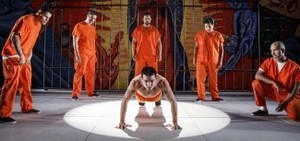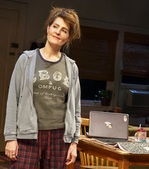
The cast photo credit: Joan Marcus
Luis Alfaro’s “Oedipus El Rey” is one of the more exciting of
the new plays to open Off Broadway so far this season. A collaboration between The
Sol Project and the Public Theater, it is a strikingly new approach to Sophocles
classic tragedy “Oedipus Rex.” Alfaro, making his New York theater debut, has twisted
and turned the famous plot just a bit and transported the original’s horrific
romantics from ancient Greece to contemporary South Central Los Angeles. That the
old story resonates quite remarkably for us today is due, of course, to the
playwright’s skill. But that we can still be stunned by its theme - the force
of destiny - and the plight of cursed, ill-fated lovers is also the result of a
terrific production under the direction of Chay Yew.
Splendid casting of all the supporting roles is a boost but
it is the performances of Juan Castano as Oedipus and Sandra Delgado as Jocasta
that propel this production that should leave you as blinded as I by the sheer force
of presentation.
Visually impressive while also minimalist in conception and
execution, the play begins within the cells of the California State Prison
where inmates (who serve as a Greek chorus) inform us of the curse that drives Oedipus
and that will determine his fate. A young Latino who has spent most of his
youth in prisons for various non-violent crimes, Oedipus has been tutored in prison
by an old blind man Tiresias (Julio Monge) who saved and raised Oedipus as his
own son after the boy’s real father Laius (Juan Francisco Villa) had order the boy
killed right after his birth. The learned Tiresias had amazingly been
incarcerated in the same prison with Oedipus after committing a robbery.
Intense physical training and intellectual studies make have
made Oedipus quite a specimen of manhood, but his fate is, nevertheless, sealed
when he is released and in an unexpected encounter kills Laius a belligerent
man whom he doesn’t know is his real father. The core of the play is passion as
it intercedes with the inherent violence and the maintenance of power in the
Latino hierarchy in street gangs. Oedipus falls almost instantly in love with Jocasta,
the sister of his friend Creon (Joel Perez) not knowing she is the widow of the
man he killed, also his real father. Yes, just as the old story tells it, Oedipus
unwittingly falls in love with the still beautiful and still in mourning Jocasta.
She has lived with no clue that her baby may have survived and has now come back
into her life.
Be prepared for one of the most explicit but beautifully
staged nude love scenes. Sensitively and sensually choreographed, it doesn’t
compromise the integrity of a play about embracing your karma and ultimately
having to pay the dept for your deeds. UnkleDave’s Fight-House deserves kudos
for directing the intimacies (also staging some exciting fight scenes) It doesn’t
hurt that both Castano and Delgado have beautiful bodies, either exposed or wearing
the fine costumes designed by Anita Yavich.
One of visual highlights is Oedipus’s encounter with a trio
of mystics who morph into a dragon. Wow! Also splendid lighting designs by Lap
Chi Chu. Don’t worry if you only have a
vague idea about Oedipus, that famous Freudian complex or the story that prompted
the name for the neurosis. The playwright has made it immediate and accessible
and above all created with the help of an imaginative production team, the kind
of sexy-visceral theatrical experience you won’t soon forget.
